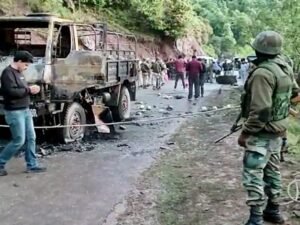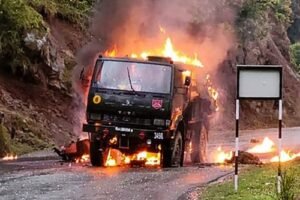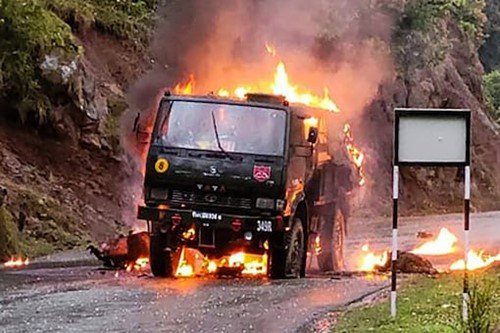Understanding the Impact: Terror Attack on IAF Convoy
In the early hours of dawn, tragedy struck as a convoy of the Indian Air Force (IAF) became the target of a heinous terror attack. This brazen assault not only shook the nation to its core but also raised pertinent questions about security protocols, intelligence gathering, and the ongoing battle against terrorism.
The Indian Air Force, often revered as the guardian of the skies, found itself vulnerable on the ground as militants ambushed the convoy in a meticulously planned operation. The attack, orchestrated with precision, left a trail of devastation, claiming the lives of several brave servicemen and civilians, and leaving many others injured.
Such acts of terror not only inflict physical harm but also leave behind deep scars on the collective psyche of a nation. The attack on the IAF convoy serves as a grim reminder of the persistent threat posed by extremist elements, both within and beyond borders. It underscores the need for unwavering vigilance and a comprehensive strategy to combat terrorism in all its forms.

One cannot overlook the ripple effects of such incidents on various fronts. From the immediate impact on national security to the long-term repercussions on diplomatic relations, the aftermath of a terror attack reverberates across multiple domains. It tests the resilience of a nation and its ability to respond decisively while upholding the values of freedom, peace, and justice.
In the wake of the attack, there is a pressing need for a thorough investigation to unearth the perpetrators and their backers. Intelligence agencies must work in tandem to gather actionable intelligence and prevent future attacks. Additionally, there should be a concerted effort to address the root causes of extremism, including socio-economic disparities, religious intolerance, and geopolitical tensions.
The role of technology in bolstering security measures cannot be overstated. From surveillance systems and facial recognition software to drone technology and cybersecurity protocols, advancements in technology offer invaluable tools to safeguard against evolving threats. However, it is imperative to strike a balance between security measures and individual freedoms to prevent the erosion of civil liberties.
Furthermore, the attack on the IAF convoy underscores the need for enhanced cooperation and information sharing among nations in the global fight against terrorism. Transnational terrorism knows no boundaries, and only through collective action can we hope to effectively tackle this scourge. Regional alliances, multilateral forums, and diplomatic channels must be leveraged to disrupt terror networks and dismantle their infrastructure.
Beyond the immediate response to the attack, there is a need for a holistic approach to counter-terrorism efforts. This includes addressing the grievances that fuel radicalization, promoting interfaith dialogue and tolerance, and investing in education and socio-economic development in vulnerable communities. By addressing the root causes of terrorism, we can create a more resilient and peaceful world for future generations.

In the aftermath of the terror attack on the IAF convoy, the resilience and resolve of the Indian people shine through. From the brave servicemen who risk their lives to protect their country to the ordinary citizens who stand in solidarity with the victims, the spirit of unity and resilience prevails. It is this collective strength that will ultimately triumph over the forces of hatred and extremism.
As we mourn the loss of lives and grapple with the trauma of the attack, let us also reaffirm our commitment to upholding the values of peace, tolerance, and unity. Let us stand together in defiance of those who seek to sow division and discord. And let us honor the memory of the fallen by working tirelessly to build a safer and more secure world for all.


